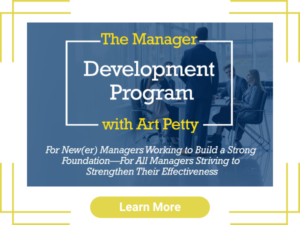One of the frequent themes in my executive and emerging leader coaching and evaluation sessions and programs is confusion over how to create and sustain an effective coaching dialog with team members. This topic ranges from constructive feedback to career discussions to those once or twice-per-year artifacts of corporate performance evaluations. Oh, and let’s not forget about offering appreciation.
My goal with this series of articles is to help managers at all levels gain clarity on the types of discussions while guiding them on a regular cadence and rhythm for engaging in these discussions. Let’s get the confusion out and give our team members the type of guidance, input, and support they desire to grow their effectiveness and success.
In this first article, we get on the same page about terminology, types of conversations, and why all forms of them need to interoperate for success.
Overheard—Commonly Asked Questions on Performance Discussions:
- What is coaching? When do I do it?
- Are performance evaluations my opportunity to give feedback?
- When do I engage in feedback?
- Are 1x1s a good time to deliver feedback?
- How much praise should I be giving my team members?
- What’s the difference between Meets and Exceeds Expectations? And, how do I explain to them that they’re just “meeting” when they think they are “exceeding?”
- Why are all my discussions on their performance one-way monologues?
- How do I talk about career development with them? Do I need to do this outside of the formal performance evaluation process?
- Everyone leaves their performance reviews stressed or upset. What am I doing wrong?
Let’s get some of the mystery and alchemy out of your coaching and evaluation work as a manager.
Getting on the Same Page with the Terms
With a shoutout to Therese Huston for her fabulous book Let’s Talk: Make Effective Feedback Your Superpower, I love how she categorizes the various moving parts of this performance management process. (Huston also gives a shoutout to the authors of Thanks for the Feedback, Douglas Stone and Sheila Heen, for these definitions.)
Coaching—those discussions that encompass what we traditionally reference as constructive feedback. In Huston’s words, “Coaching is feedback aimed at helping the other person adapt, pivot, learn, and grow.” It ranges from advice to well-designed feedback based on observations. Coaching is less about telling and talking and more about the two of you designing and discussing. Coaching is frequent, based on observation and discussion.
Importantly, I incorporate career discussions/coaching under this umbrella as well. We’ll dedicate an entire posting to this topic.
Appreciation—comments/commentary on what you observed that someone did great. Specificity is critical here, much like your feedback. And yes, appropriately delivered appreciation is also a form of coaching, in my opinion.
Evaluation is just that. It’s an assessment of where someone stands at a point in time, ideally relative to properly defined expectations and carefully constructed goals. Evaluation often occurs at prescribed times, including the mid and end/beginning of the year, subject to the organization’s policies and calendar. However, it can take place at the request of your team member or via regular check-ins outside of the formal evaluation cycle defined by the firm. And a solid goals process offers the opportunity for regular evaluation and coaching.
Appreciation, Coaching, and Evaluation Must Interoperate to Be Effective
In my Managers Operating System framework, I incorporate all three performance management tools plus career development coaching under a broader coaching label. Importantly, they must all be present and active in the working environment and manager-employee relationship.
People thrive on appreciation, and it should be plentiful and specific when observed/earned. Coaching—effectively helping someone grow stronger and become more successful must be a constant part of the story. Individuals need context for where they stand relative to expectations. And career development discussions are some of the most valuable any manager and employee can have to promote learning, growth, goal-setting, generate engagement and grow contributions.
Leave any of these out of the regular manager-employee narrative, and the relationship grows out of balance.
Where I’m Going With This Article Series
In the next articles, I will break down and explore each activity/dialog outlined above (coaching feedback, career coaching, appreciation, evaluation) and share best practices. Additionally, I will offer recommendations on developing the right rhythm and cadence for these discussions.
My goal in this series is to help managers at all levels. open the floodgates for productive, meaningful dialog with their team members. The lack of this consistent, timely dialog leads in part to high levels of disengagement and individuals leaving for fresh environments or checking out while on the job. As a manager motivated to do your best for your team, firm, and yourself, these discussions are essential for success.
![]()
Next Up: A Feedback Primer—Appreciation and Constructive.
—
The Manager Development Program is a unique, cohort-based PLUS coaching program designed for newer managers. In the program, managers learn my Managers Operating System framework, with coaching, feedback, evaluation, and career development discussions. Check here for an indication of upcoming sessions.


